Dmitriy Zheleznyakov
On Expansion and Contraction of DL-Lite Knowledge Bases
Jan 25, 2020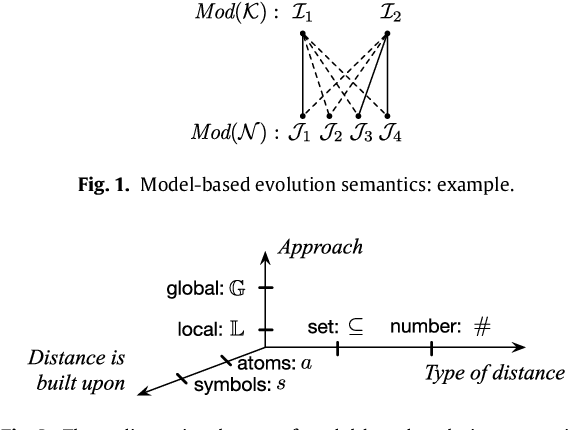
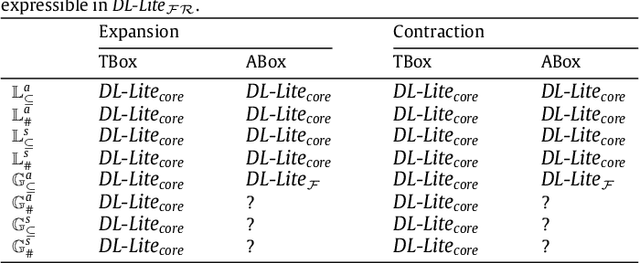

Abstract:Knowledge bases (KBs) are not static entities: new information constantly appears and some of the previous knowledge becomes obsolete. In order to reflect this evolution of knowledge, KBs should be expanded with the new knowledge and contracted from the obsolete one. This problem is well-studied for propositional but much less for first-order KBs. In this work we investigate knowledge expansion and contraction for KBs expressed in DL-Lite, a family of description logics (DLs) that underlie the tractable fragment OWL 2 QL of the Web Ontology Language OWL 2. We start with a novel knowledge evolution framework and natural postulates that evolution should respect, and compare our postulates to the well-established AGM postulates. We then review well-known model and formula-based approaches for expansion and contraction for propositional theories and show how they can be adapted to the case of DL-Lite. In particular, we show intrinsic limitations of model-based approaches: besides the fact that some of them do not respect the postulates we have established, they ignore the structural properties of KBs. This leads to undesired properties of evolution results: evolution of DL-Lite KBs cannot be captured in DL-Lite. Moreover, we show that well-known formula-based approaches are also not appropriate for DL-Lite expansion and contraction: they either have a high complexity of computation, or they produce logical theories that cannot be expressed in DL-Lite. Thus, we propose a novel formula-based approach that respects our principles and for which evolution is expressible in DL-Lite. For this approach we also propose polynomial time deterministic algorithms to compute evolution of DL-Lite KBs when evolution affects only factual data.
Towards Analytics Aware Ontology Based Access to Static and Streaming Data (Extended Version)
Aug 15, 2016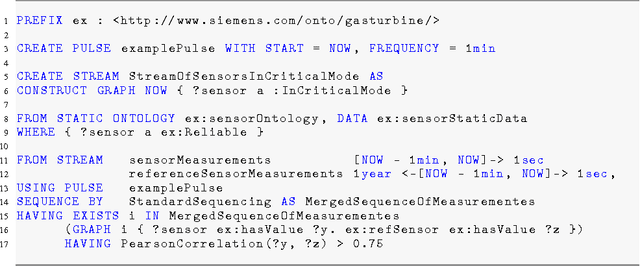

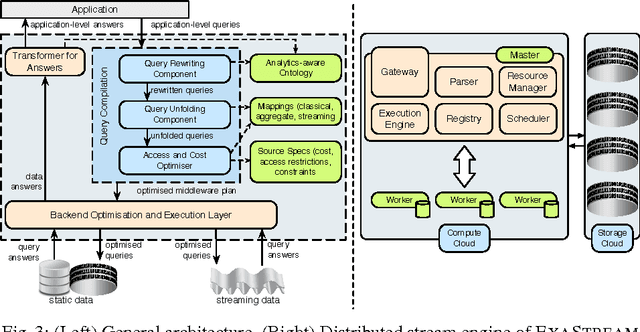
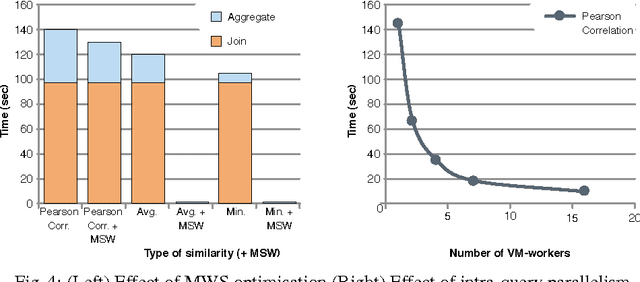
Abstract:Real-time analytics that requires integration and aggregation of heterogeneous and distributed streaming and static data is a typical task in many industrial scenarios such as diagnostics of turbines in Siemens. OBDA approach has a great potential to facilitate such tasks; however, it has a number of limitations in dealing with analytics that restrict its use in important industrial applications. Based on our experience with Siemens, we argue that in order to overcome those limitations OBDA should be extended and become analytics, source, and cost aware. In this work we propose such an extension. In particular, we propose an ontology, mapping, and query language for OBDA, where aggregate and other analytical functions are first class citizens. Moreover, we develop query optimisation techniques that allow to efficiently process analytical tasks over static and streaming data. We implement our approach in a system and evaluate our system with Siemens turbine data.
Controlled Query Evaluation for Datalog and OWL 2 Profile Ontologies
Apr 24, 2015

Abstract:We study confidentiality enforcement in ontologies under the Controlled Query Evaluation framework, where a policy specifies the sensitive information and a censor ensures that query answers that may compromise the policy are not returned. We focus on censors that ensure confidentiality while maximising information access, and consider both Datalog and the OWL 2 profiles as ontology languages.
Verification of Inconsistency-Aware Knowledge and Action Bases (Extended Version)
Apr 23, 2013Abstract:Description Logic Knowledge and Action Bases (KABs) have been recently introduced as a mechanism that provides a semantically rich representation of the information on the domain of interest in terms of a DL KB and a set of actions to change such information over time, possibly introducing new objects. In this setting, decidability of verification of sophisticated temporal properties over KABs, expressed in a variant of first-order mu-calculus, has been shown. However, the established framework treats inconsistency in a simplistic way, by rejecting inconsistent states produced through action execution. We address this problem by showing how inconsistency handling based on the notion of repairs can be integrated into KABs, resorting to inconsistency-tolerant semantics. In this setting, we establish decidability and complexity of verification.
 Add to Chrome
Add to Chrome Add to Firefox
Add to Firefox Add to Edge
Add to Edge